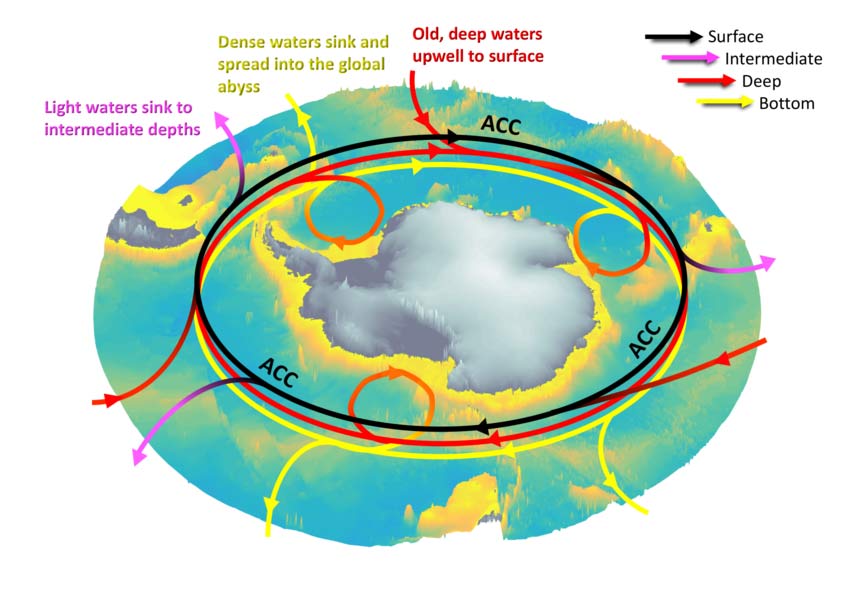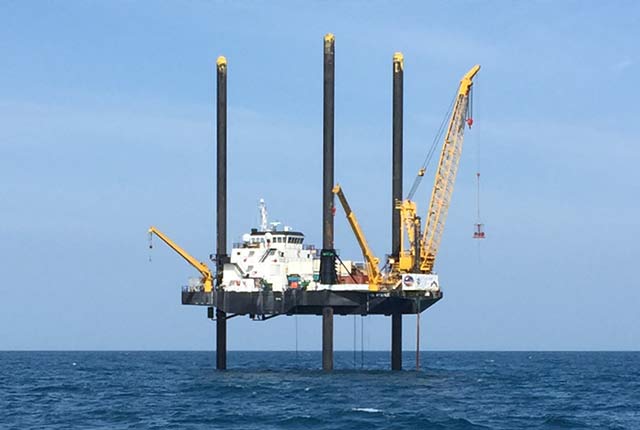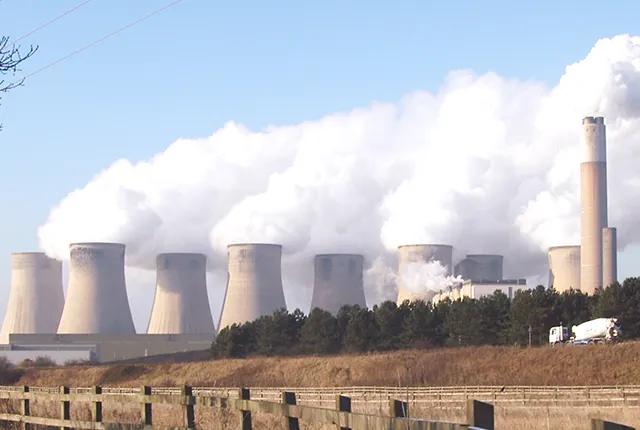Climate change is one of the most urgent issues facing humanity and life on Earth.
Whilst our everyday understanding of climate concerns the warmth of the atmosphere, the ocean is critical in controlling how our planet’s climate changes. This is because the ocean absorbs vast quantities of heat and carbon dioxide (CO2) that, if they had remained in the atmosphere, would have greatly accelerated the rate of climatic change there.

Since the industrial revolution, the global ocean has absorbed around 30 per cent of human-produced (anthropogenic) CO2 emissions. In addition, 93 per cent of the total extra heat in the Earth system since the onset of global warming has been absorbed by the ocean. This is equivalent to around 170 terawatts — the power that would be required for each of the seven billion people on Earth to continuously operate sixteen 1500 watt hairdryers.
Improving climate prediction requires us to learn more about how the ocean works and how it interacts with the atmosphere to control the split of heat and carbon between them. A key region in this context is the Southern Ocean; the vast sea that encircles Antarctica.
Although the Southern Ocean occupies only around 20 per cent of the total ocean area, it absorbs about three-quarters of the heat that is taken into the ocean and approximately half of the CO2. This is because of its unique pattern of ocean circulation: it is the key region globally where deep waters upwell to the surface from 1–2 km down, allowing new water masses to form and sink back into the ocean interior. The exposure of old waters to the atmosphere and the production of new waters are fundamental to the exchanges of heat and carbon with the atmosphere.
Despite this knowledge of the key role the Southern Ocean plays in global climate, there are many important unknowns. These include:
- an incomplete understanding of the detailed mechanisms by which heat and carbon are transferred across the sea surface and drawn down into the interior
- a lack of knowledge of the rates of these transfers and how they will change in future
- insufficient information of the distribution of the heat and carbon around the globe within the planetary-scale ocean circulation

The overturning circulation in the Southern Ocean and the lateral flows around the Antarctic continent. Source: Meredith (2016), Geophysical Research Letters.
To address these issues, a new £8.4 million programme funded by NERC has been created: Ocean Regulation of Climate by Heat and Carbon Sequestration and Transports or ORCHESTRA. The project is led by the British Antarctic Survey (BAS), in partnership with:
- National Oceanography Centre (NOC)
- BGS
- Plymouth Marine Laboratory
- Centre for Polar Observation and Modelling (CPOM)
- Sea Mammal Research Unit at the University of St Andrews
- UK Met Office
- numerous national and international partners
ORCHESTRA will span five years and use a combination of data collection, analyses and computer simulations to radically improve our ability to measure, understand and predict the circulation of the Southern Ocean and its role in the global climate. It will make unique and important new measurements in the Southern Ocean using a range of techniques, including use of RRS James Clark Ross and RRS Sir David Attenborough, as well as deployments of autonomous surface and underwater vehicles, the BAS meteorological aircraft and other innovative techniques for collecting data. It will also involve the development and use of advanced ocean and climate simulations, to improve our ability to predict climatic change in coming decades.
Full details of the ORCHESTRA programme, including the detailed descriptions of the fieldwork and model developments, are available in the Case for Support. This was approved for funding by NERC following international peer review and assessment by the NERC science board.
Our programme aim is to advance our understanding of, and capability to predict, the Southern Ocean’s impact on climate change via its uptake and storage of heat and carbon.
ORCHESTRA will significantly reduce current uncertainties concerning how the uptake and storage of heat and carbon by the ocean influences global climate, by conducting a series of unique fieldwork campaigns and innovative model developments. This is a leading-order challenge of great societal relevance and strategic importance to NERC, but progress is currently hampered by poor provision of data with which to improve understanding of the key processes and constrain their rates, and inadequate representation of the key dynamics in ocean and climate forecast models.
The area requiring the most urgent improvement is the Southern Ocean, where many of the controlling mechanisms and exchanges occur, and yet where data coverage is most sparse, dynamical understanding is weakest, and climate models show greatest biases and least realistic depictions of processes.
ORCHESTRA will address these issues using the UK’s world-leading capability and infrastructure in ocean and high-latitude research, including major ship expeditions, autonomous vehicle deployments and research aircraft campaigns, with the data collected used to improve model schemes and validate model outputs, and with the improved capability fed through to UK climate model development.
ORCHESTRA represents the first fully unified activity by NERC institutes to address these challenges, and will draw in national and international partners to provide community coherence and to build a legacy in knowledge and capability that will transcend the timescale of the programme itself.
Data will be managed by the British Oceanographic Data Centre (BODC) by Joana Beja De Almeida E Silva.
More details will be added here after our first cruise — planned for this coming season (2016/17).
The Stable Isotope Facility is a node of the NERC Isotope Geosciences Facilities and employs a wide variety of stable isotope methodologies in environmental change, pollution, hydrology, and human-landscape interactions research.
We focus on the environment, in particular climate change and human-landscape interactions, with increasing importance on the Anthropocene and the modern calibration period. We also use stable isotopes as tracers of modern pollution and understanding the hydrological cycle, especially in areas affected by human impact. We work with the UK higher education institutes community and international partners to deliver research, method development and training.
Blogs
- Homeward Bound: Last Leg of the ORCHESTRA Cruise (Part 4)…
16/5/19 by Carol Arrowsmith - Full steam ahead with the sampling on the RRS James Clark Ross:
ORCHESTRA Part 3
18/3/19 by Carol Arrowsmith - From Chile to the Falklands and beyond: ORCHESTRA Part 2
4/3/19 by Carol Arrowsmith - Investigating the Southern Ocean: Part 1
20/2/19 by Carol Arrowsmith - Last leg of ORCHESTRA cruise part 5
23/11/18 by Melanie Leng - Sampling starts on the RRS James Clark Ross: ORCHESTRA part 4
13/11/18 by Melanie Leng - On board the RRS James Clark Ross: ORCHESTRA part 3
9/11/18 by Melanie Leng - I am in Stanley: ORCHESTRA part 2
7/11/18 by Melanie Leng - Wish me Fair Winds and Following Seas: investigating the Southern Ocean Part 1
22/10/18 by Melanie Leng - Survival at sea as part of ORCHESTRA: Part 3
16/10/17 by Chris Kendrick - The start of a major new research project (ORCHESTRA): Part 2
- 14/6/17 by Carol Arrowsmith
- The start of a major new research project
- 31/8/16 by Carol Arrowsmith
BGS publications
Meredith, M P, Venables, H J, Stammerjohn, S E, Ducklow, H W, Martinson, D G, Iannuzzi, R A, Leng, M J, van Wessem, J M, Reijmer, C H, Barrand, N E. 2016. Changing distributions of sea ice melt and meteoric water west of the Antarctic Peninsula. Deep Sea Research Part II: Topical Studies in Oceanography Volume 139, May 2017, Pages 40–57.
Brown, P J, Meredith, M P, Jullion, L, Naveira Garabato, A, Torres-Valdes, S, Holland, P, Leng, M J, Venables, H. 2014. Freshwater fluxes in the Weddell Gyre: results from δ18O. Philosophical Transactions of the Royal Society of London, A, 372. 10.1098/rsta.2013.0298.
Meredith, M P, Venables, H J, Clarke, A, Ducklow, H W, Erickson, M, Leng, M J, Lenaerts, J T M, van den Broeke, M R. 2013. The freshwater system west of the Antarctic Peninsula: spatial and temporal changes. Journal of Climate, 26, 1669–1684.
Meredith, M P, Wallace, M I, Stammerjohn, S E, Renfrew, I A, Clarke, A, Venables, H, Shoosmith, D R, Souster, T, Leng, M J. 2010. Changes in the freshwater composition of the upper ocean west of the Antarctic Peninsula during the first decade of the 21st century. Progress in Oceanography, 87, 127–143.
Abrahamsen, E P, Meredith, M P, Falkner, K K, Torres-Valdes, S, Leng, M J, Alkire, M B, Bacon, S, Laxon, S W, Polyakov, I, Ivanov, V. 2009. Tracer-derived freshwater composition of the Siberian continental shelf and slope following the extreme Arctic summer of 2007. Geophysical Research Letters, 36, L07602, doi:10.1029/2009GL037341.
Meredith, M P, Brandon, M A, Wallace, M I, Clarke, A, Leng, M J, Renfrew, I A, Van Lipzig, N P M, King, J C. 2008. Variability in the freshwater balance of northern Marguerite Bay, Antarctic Peninsula: results from δ18O. Deep Sea Research II, 55, 309–322. doi:10.1016/j.dsr2.2007.11.005.
Contact
If you would like to discover more then please contact Mel Leng.
You may also be interested in

Sea floor: scientific ocean drilling
Implementing several high profile expeditions for the European Consortium for Ocean Research Drilling (ECORD).

Carbon capture and storage
Studying carbon dioxide storage as a recognised European centre of excellence in a number of research areas.



